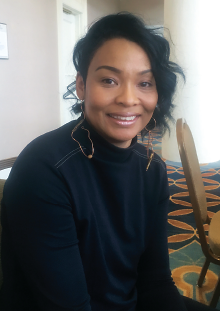“Black men bad … all of them crazy.” So says a pretty Korean wife and mother, Young Hie Kim, to her African-American mother-in-law, Pearlie May, in “Black Korea,” a short but searing drama about the children born of African-American servicemen stationed on the Korean peninsula and their Korean wives who follow them back to America.
The movie, approximately 30 minutes long, was shown last month at the Spring Educational Conference of the Black Psychiatrists of America (BPA) in Memphis. Written and conceived by Patti Kim Gill, “Black Korea” describes the conflicts and contradictions that come with being born with a foot in two distinct cultures—as well as the rich heritage and strength of character that upbringing may confer. It offers a portrait of a little-known subculture of the larger African-American community.
“It’s a stunning piece of work,” APA President-elect Altha Stewart, M.D., said of the film. “It really shows how rich and varied is the African-American experience when one’s identity is blended with other cultures. It also shows how important it is for psychiatrists to understand all the cultures from which our patients come and how it shapes who they are and how they may present for treatment.”
“Black Korea” follows two children—brother and sister—who are being left at their grandmother’s house on the South Side of Chicago by their Korean mother. She is in flight from an alcoholic and abusive husband—the children’s father—and arrives at her mother-in-law’s house wearing dark glasses to hide a bruised eye caused by a beating by her husband. Pearlie May’s home is warm and welcoming—there’s a reason the young mother knows her children will be safe here—but it is also, to Young Hie Kim, an alien culture; Pearlie May seeks to heal the mother’s wounds through an ecstatic Christian laying-on of hands.
Thus do the brother and sister inherit a dual culture—as small children in their mother’s house eating kimchi (a Korean staple of fermented vegetables and spices) and later absorbing the fervent Christian faith in Pearlie May’s home.
The story hews closely to the experience of Patti Kim Gill, who was left at age 12 by a Korean mother with her grandmother in the south Chicago neighborhood of Englewood. “In Asian culture—especially Japanese and Korean culture—they really believe in purity of blood, so they didn’t see me as Korean,” she said in comments to psychiatrists at the BPA meeting. “I was black. But I grew up Korean, eating Korean food. At the same time, I also had a good grandmother—she was the matriarch of the neighborhood. I sometimes went to church every day. Having that as a foundation was an enormous blessing.”
In comments to Psychiatric News after the screening, Gill said the movie had its genesis with a weblog she writes about her black and Korean heritage (myseoulfood.com). When screenwriter Christine Swanson chanced upon the blog, she said, “You’ve got to make a movie.”
Gill says she believes that screening the film for an audience of psychiatrists makes sense. “A more complete understanding of people’s cultural background and differences can help mental health professionals treat the whole person,” she said. ■


